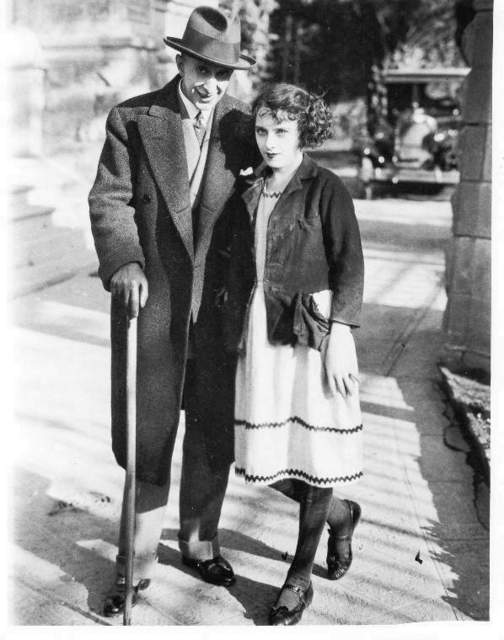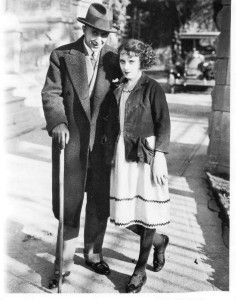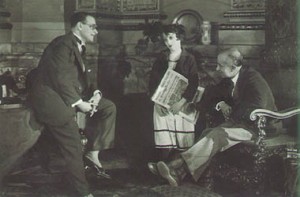Scene 4. Exit. House of Don Fernando. Street View. (Long Shot)
Enrique exiting the house. Stops on the sidewalk. Lights a cigarette. In the distance one sees Chiquita shouting, selling her newspapers; she comes at full speed. Enrique has not seen her…
—Cándida Beltrán Rendón, El secreto de la abuela, original film story
Around 1914, at the age of sixteen, Cándida Beltrán Rendón wrote the film story El secreto de la abuela/The Grandmother’s Secret. A copy of this story can be found in the Archivo General de la Nación in Mexico City. Fourteen years later, in 1928, Beltrán Rendón, at thirty years of age, directed her first and only motion picture—a feature—from a script based on her story and became the last of the five women who directed during Mexican cinema’s silent period. Granddaughter of José Rendón Peniche (1829–1887), an important political figure in the southeast region of Mexico during the nineteenth century (Ciuk 2000, 69), Cándida’s full name was Candelaria Beltrán Rendón. Although she was not the firstborn of the siblings, after her parents died, she took charge of a large family composed of at least seven girls and two boys.
Unlike the actress and producer Mimí Derba, the Italian opera singer María Cantoni, or the photographers and documentary filmmakers Adriana and Dolores Ehlers —the four primary women directors of Mexican cinema—Beltrán Rendón had no previous experience in either the theatre or motion pictures. Instead, she worked in Mexico City as an employee of the town hall and in a shoe store. Her path into the field remains unknown, but she secured the help of Jorge Stahl, a cinematographer, and members of Gregorio Martínez Sierra’s Spanish theatrical company. Playwright Martínez Sierra (1881–1947) gave advice to her about perfecting the film story according to a review in Yucatán Ilustrado (Ramírez 1989, 248). In a case of unparalleled versatility among the all-Mexican features directed by women, Beltrán Rendón served as producer, director, set designer, and star for El secreto de la abuela (Vázquez and Bernardo 1996, 31). As producer, she financed the seventy-five-minute fiction film with her own resources, in the manner of contemporary independent cinema.
El secreto de la abuela, one of the four or five Mexican features produced in 1928, was filmed in the former headquarters of the Ministry of Foreign Affairs in Mexico City, among other locations (Dávalos Orozco and Bernal 1985, 126–28). It focused on the character of a poor orphan named Chiquita, played by Beltrán Rendón, who supports her blind grandmother by selling newspapers on the street. Chiquita begins a friendship with a wealthy older man who asks to adopt her. However, her grandmother confesses a secret: the man who wants to adopt her is actually the orphan’s grandfather. “A melodrama about orphanhood problems and irresponsible masculine-parenthood,” it shared some common thematic points with Martínez Sierra’s very popular 1911 play “Canción de cuna”/“The Cradle Song” (De la Vega Alfaro 1991, 19).
With filming finished in September, Beltrán Rendón introduced herself in a press interview—referenced by Guadalupe Appendini—as just a “humble employee who, without money and any support, have succeeded with my own will… to make the first artistic film made in Mexico” (15-B). She screened El secreto de la abuela for the press in early October 1928, and the film was released to the public one or two months later that year in the Regis Theatre, where Martínez Sierra’s company had been working since 1927. Despite favorable reviews about Beltrán’s acting play (Dávalos Orozco and Bernal 1985, 128) and Stahl’s cinematography that captured anonymous “people, agglomerated in the corners, with anxious curiosity, seeing a camera filming in front of them” (Peimbert 1928, n. pag.), Beltrán Rendón never returned to the cinema. The financial obligations that she took on in order to produce El secreto de la abuela and the difficulties she encountered in the production of this film contributed to her retirement. Although in 1919, she told Appendini that she had written more film stories as well as some short stories, no trace of them has been found (15-B).
As with all the women screenwriters active in the Mexican silent cinema—with the exception of Derba and perhaps María Cantoni—Beltrán Rendón has only one film credited to her name (Vázquez and Bernardo 1996, 31). She later became a composer of well-known musical compositions such as “Mesticita yucateca”/“Little Yucatecan Crossbreed,” “Este amor”/“This Love,” “Navidad en el hogar”/“Christmas at the Hearth,” “Madre mía”/“Mother mine,” and “A mi madre”/“To My Mother”; the last two gave form to “Homenaje a las madres en la voz de Luis Ortega”/“Homage to the Mothers, in the Voice of Luis Ortega,” an extended play (EP) produced to celebrate Mother’s Day.



